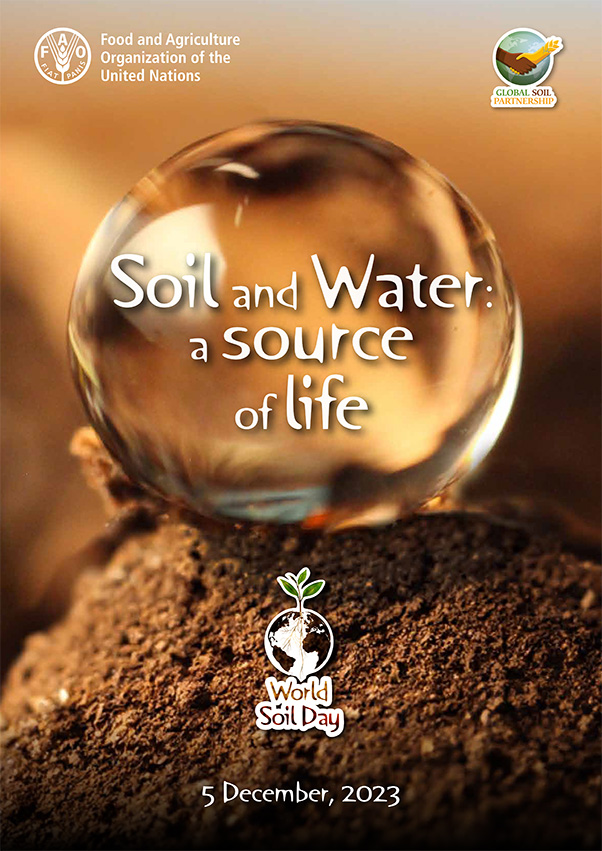World Soil Day
World Soil Day
World Soil Day (WSD) is held annually on 5 December as a means to focus attention on the importance of healthy soil and to advocate for the sustainable management of soil resources.
Background
An international day to celebrate soil was recommended by the International Union of Soil Sciences (IUSS) in 2002. Under the leadership of the Kingdom of Thailand and within the framework of the Global Soil Partnership, FAO has supported the formal establishment of WSD as a global awareness raising platform. The FAO Conference unanimously endorsed World Soil Day in June 2013 and requested its official adoption at the 68th UN General Assembly. In December 2013, the UN General Assembly responded by designating 5 December 2014 as the first official World Soil Day.
Theme for 2023 - Soil and water, a source of life
 Our planet’s survival depends on the precious link between soil and water. Over 95 percent of our food originates from these two fundamental resources. Soil water, vital for nutrient absorption by plants, binds our ecosystems together. This symbiotic relationship is the foundation of our agricultural systems.
Our planet’s survival depends on the precious link between soil and water. Over 95 percent of our food originates from these two fundamental resources. Soil water, vital for nutrient absorption by plants, binds our ecosystems together. This symbiotic relationship is the foundation of our agricultural systems.
However, in the face of climate change and human activity, our soils are being degraded, putting excessive pressure on our water resources. Erosion disrupts the natural balance, reducing water infiltration and availability for all forms of life.
Sustainable soil management practices, such as minimum tillage, crop rotation, organic matter addition, and cover cropping, improve soil health, reduce erosion and pollution, and enhance water infiltration and storage. These practices also preserve soil biodiversity, improve fertility, and contribute to carbon sequestration, playing a crucial role in the fight against climate change.
World Soil Day 2023 (WSD) and its campaign aim to raise awareness of the importance and relationship between soil and water in achieving sustainable and resilient agrifood systems. WSD is a unique global platform that not only celebrates soils but also empowers and engages citizens around the world to improve soil health.
Did you know?
- 95% of our food comes from soils.
- One cubic meter of healthy soil can retain over 250 liters of water.
- Improper soil and water management practices affect soil erosion, soil biodiversity, soil fertility, and water quality and quantity.
- Healthy soil plays a crucial role as a natural filter, purifying and storing water as it infiltrates into the ground.
World Soil Day 2023 Key Messages:
- Soil and water are essential resources for sustaining life on Earth.
- Soil and water provide the foundation for food production, ecosystems, and human well-being. Recognizing their invaluable roles, we can take proactive measures to safeguard these resources for future generations.
- Soil erosion and compaction disrupt the capacity of soil to store, drain and filter water, and exacerbates the risk of flood, landslides and sand/dust storms.
- Soil and water are the medium in which plants grow and obtain essential nutrients.
- Healthy soil plays a crucial role as a natural filter, purifying and storing water as it infiltrates into the ground.
- Rainfed agriculture systems account for 80 percent of croplands, contributing to 60 percent of the global food production. These systems rely heavily on effective soil moisture management practices.
- Irrigated agriculture systems withdraw 70% of the world's freshwater and account for 20 percent of croplands.
- Soil and water are interconnected resources that need integrated management.
- The health of the soil and the quality and availability of water are interconnected.
- Implementing sustainable soil management practices enhances water availability for agriculture. Healthy soils, enriched with organic matter, play a crucial role in regulating water retention and availability.
- Efficient use of quality water, promoting the sustainable use of fertilizers and pesticides, employing appropriate irrigation methods, improving drainage systems, controlling pumping, and monitoring soil and groundwater salinity levels are essential to maintaining sustainable agricultural practices.
- Sustainable soil management is key to improve water productivity in irrigated systems.
- Improper soil and water management practices affect soil erosion, soil biodiversity, soil fertility, and water quality and quantity.
- Water scarcity leads to the loss of soil biodiversity, while leaching and eutrophication from agriculture practices lead to the loss of biodiversity in water bodies.
- The mismanagement of pesticides and fertilizers not only threatens soil and water quality but also poses significant risks to human health and ecosystems.
- Poor irrigation and drainage practices are some of the main drivers of soil salinization.
- Rising sea levels contribute to land loss, increasing the risk of soil salinization and sodification, which can negatively impact agricultural productivity.
- Soil and water conservation contribute to climate change mitigation and adaptation.
- Improved soil and water management improves the land's capacity to withstand extreme climate events such as droughts, floods and sand/dust storms.
- Integrated soil and water management practices provide essential ecosystem services, supporting life on earth and enhancing ecosystem resilience.
- Healthy soils act as a carbon sink, by sequestering carbon from the atmosphere, thus contributing to both climate change adaptation and mitigation efforts.
Source : UN
Related resources
Last Modified : 12/7/2023
Provides information about Brown manuring: an effe...
Provides information about Zinc Solubilizing Bacte...
This section covers about Agricultural Credit rela...
The topic provides information about the Soil Heal...
